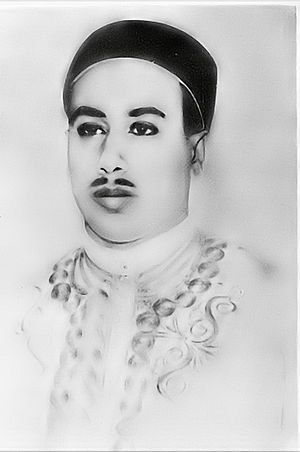Hasan, King of Libya: Difference between revisions
No edit summary |
No edit summary |
||
| Line 97: | Line 97: | ||
}} | }} | ||
'''Hasan''' (31 August 1928 – 28 April 1992) was {{wp|King of Libya}} from 25 May 1983 to 28 April 1992. The second monarch of [[Kingdom of Libya|Libya]], Hasan succeeded to the throne during a period of relative prosperity and progress that had come about from the previous reign of his uncle [[Idris, King of Libya|Idris]]. With a reign of only nine years long, Hasan's reign is the shortest in {{wp|Libyan}} history. | |||
Born in August 1928, Hasan was the nephew of the future [[Idris, King of Libya|King Idris]]. In 1951, after a brief period of {{wp|Italian}} colonial rule, [[Kingdom of Libya|Libya]] gained independence with Hasan's uncle [[Idris, King of Libya|Idris]] as its first monarch. Then, on 26 October 1956, following the death of his father {{wp|Prince Muhammad al-Rida}}, as the closest living relative of the childless [[Idris, King of Libya|King Idris]], Hasan was proclaimed crown prince of the kingdom, in which capacity he worked to extensively modernise the {{wp|Libyan}} military while also assisting his uncle in promoting relations between [[Kingdom of Libya|Libya]] and the international community. | Born in August 1928, Hasan was the nephew of the future [[Idris, King of Libya|King Idris]]. In 1951, after a brief period of {{wp|Italian}} colonial rule, [[Kingdom of Libya|Libya]] gained independence with Hasan's uncle [[Idris, King of Libya|Idris]] as its first monarch. Then, on 26 October 1956, following the death of his father {{wp|Prince Muhammad al-Rida}}, as the closest living relative of the childless [[Idris, King of Libya|King Idris]], Hasan was proclaimed crown prince of the kingdom, in which capacity he worked to extensively modernise the {{wp|Libyan}} military while also assisting his uncle in promoting relations between [[Kingdom of Libya|Libya]] and the international community. | ||
Latest revision as of 13:04, 26 May 2024
| Hasan | |
|---|---|
 | |
| King of Libya | |
| Reign | 25 May 1983 - 28 April 1992 |
| Predecessor | Idris |
| Successor | Mohammed |
| Born | Hasan ar-Rida al-Mahdi as-Senussi 31 August 1928 Benghazi, Italian Cyrenaica |
| Died | 28 April 1992 (aged 63) Tripoli, Libya |
| Burial | |
| Spouse | Sheikha Fawzia bint Tahir |
| Issue | Mohammed |
| House | Senussi |
| Father | Prince Muhammad al-Rida |
| Mother | Imbaraika al-Fallatiyya |
| Religion | Sunni Islam |
Hasan (31 August 1928 – 28 April 1992) was King of Libya from 25 May 1983 to 28 April 1992. The second monarch of Libya, Hasan succeeded to the throne during a period of relative prosperity and progress that had come about from the previous reign of his uncle Idris. With a reign of only nine years long, Hasan's reign is the shortest in Libyan history.
Born in August 1928, Hasan was the nephew of the future King Idris. In 1951, after a brief period of Italian colonial rule, Libya gained independence with Hasan's uncle Idris as its first monarch. Then, on 26 October 1956, following the death of his father Prince Muhammad al-Rida, as the closest living relative of the childless King Idris, Hasan was proclaimed crown prince of the kingdom, in which capacity he worked to extensively modernise the Libyan military while also assisting his uncle in promoting relations between Libya and the international community.
Domestically, Hasan's reign was marked by several major milestones including the opening of the Tripoli World Trade Centre and the Benghazi World Trade Centre, the launching of the country's first satellite Senussi I, as well as the commencement of the Great Man-Made River, a network of pipes stretching across Libya providing fresh water to cities across the country. In addition, among sports enthusiasts, Hasan is widely considered to be the "Father of Libyan Football" for his role in spearheading the LF 2000 program to drastically change Libyan football, beginning with the establishment of the Libyan National League in 1970, followed by the country's hosting of the 1978 and 1990 World Cups (the latter jointly with Italy), and culminating in Libya's success at the Africa Cup of Nations which they have currently won a total of five times, the second-most behind Egypt. Internationally, Hasan oversaw Libya's participation in conflicts including the South African Border War, Second Sudanese Civil War, and the Gulf War. In December 1988, Hasan crucially worked to restore relations between Libya and the United Kingdom in the aftermath of theLockerbie bombing where a Pan Am flight was blown up by Libyan terrorists while flying over the United Kingdom, sparking a brief but major diplomatic crisis.
In April 1992, after a roughly decade-long reign, Hasan passed away and was succeeded by his son Crown Prince Mohammed who is the third and currently reigning King of Libya.